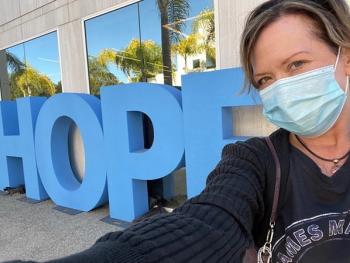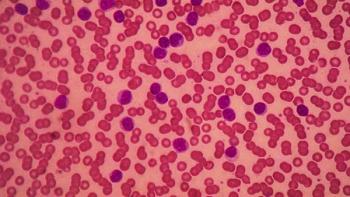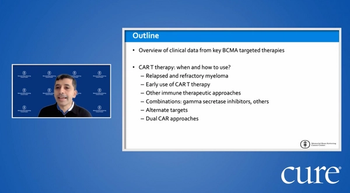
Compared with Yervoy alone, the use of Yervoy plus Opdivo was associated with a significant survival benefit as a second-line treatment in patients with previously treated advanced melanoma, a type of skin cancer.

Ryan McDonald, Associate Editorial Director for CURE®, has been with the team since February 2020 and has previously covered medical news across several specialties prior to joining MJH Life Sciences. He is a graduate of Temple University, where he studied journalism and minored in political science and history. He considers himself a craft beer snob and would like to open a brewery in the future. During his spare time, he can be found rooting for all major Philadelphia sports teams. Follow Ryan on Twitter @RMcDonald11 or email him at [email protected].

Compared with Yervoy alone, the use of Yervoy plus Opdivo was associated with a significant survival benefit as a second-line treatment in patients with previously treated advanced melanoma, a type of skin cancer.

Over the past 20 years, advancements in the lung cancer space have led to a drastic paradigm shift in how patients are now treated, ultimately leading to substantial improvements in survival and patient quality of life.

Investigators plan to enroll approximately 90 patients with squamous cell carcinoma of the head and neck, as well as metastatic bladder and non-small cell lung cancer.

The FDA’s partial hold means that no new patients with either leukemia or lymphoma can be enrolled onto the trial.

Watch Dr. Sham Mailankody, from Memorial Sloan Kettering Cancer Center, discuss CAR and BiTE therapy, during the CURE Educated Patient Multiple Myeloma Summit.

The FDA’s decision to approve Yescarta in patients with large B-cell lymphoma that has failed to respond to first-line treatment is based on data that showed that the use of the CAR-T cell therapy resulted in a significant increase in patients who were alive at two years compared with the standard-of-care second-line treatment.

The FDA plans to decide on whether to approve futibatinib for the treatment of patients with previously treated, locally advanced or metastatic cholangiocarcinoma that harbors a certain genetic mutation by September.

It is expected that up to 18 patients with leptomeningeal metastases — a serious form of cancer that has spread from its original location to an area surrounding the brain and spinal cord — will receive treatment with the investigational drug.

Approximately 60 patients with metastatic/unresectable solid tumors, including bladder cancer, are expected to be enrolled onto a clinical trial assessing the safety and efficacy of Zepzelca.

The study authors plan to enroll 24 patients with glioblastoma, an aggressive brain tumor, to assess the efficacy an investigational drug plus Libtayo prior to surgery to remove the tumor.

The FDA’s decision follows a recommendation from a panel of experts that suggested the agency not approve sintilimab plus the chemotherapy pemetrexed and platinum-based chemotherapy for patients with non-squamous non-small cell lung cancer.

From Pfizer issuing a voluntary recall of three blood pressure drugs due to a high level of a cancer-causing chemical to “Today Show” co-ancho Hoda Kotb discussing her struggles with fertility after receiving a diagnosis of breast cancer, here’s what’s happening in the cancer space this week.

The use of bempegaldesleukin and Opdivo failed to meet its goal of significantly improving progression-free survival and responses to treatment, compared with Opdivo alone in patients with previously untreated unresectable or metastatic melanoma, according to data from an initial analysis of the phase 3 PIVOT IO-001 study.

“These results position mirvetuximab soravtansine to become a practice-changing, biomarker-driven, standard-of-care treatment option for patients with (high folate receptor-alpha)-positive, platinum-resistant ovarian cancer,” noted one of the study authors.

The FDA’s decision to greenlight Opdualag is based on data that showed that the combination more than doubled survival without disease progression when compared with Opdivo in patients with previously untreated metastatic or unresectable melanoma, a type of skin cancer.

Approximately 100,000 patients with stage 1 to stage 3 solid tumors will be enrolled onto the trial across 25 sites, according to the manufacturer of the test aimed at detecting cancer recurrence.

The early-stage trial, according to the investigational drug’s manufacturer, Adagene, is expected to take place across multiple sites in the United States and Asia Pacific.

Four sites across the United States are enrolling patients with locally advanced or metastatic pancreatic cancer to see if a novel drug combined with standard-of-care chemotherapy bests chemotherapy alone in survival outcomes and responses to treatment.

The findings, according to the study’s lead author, justify the use of Opdivo plus relatlimab as a new treatment option for patients with advanced melanoma, a form of skin cancer.

In a news release, Merck advised patients enrolled on the trial to consult with their health care provider regarding their treatment.

Treatment with amcenestrant failed to improve survival when compared with a physician’s choice of a single-agent endocrine therapy in patients with metastatic or locally advanced breast cancer.

The FDA’s decision to OK Lynparza is based on data from the OlympiA trial, which showed that Lynparza reduced the risk of invasive breast cancer recurrences, second cancers or death by 42% versus placebo after initial treatment with chemotherapy.

The FDA plans to speed up its review of HPN217 for the treatment of patients with relapsed, refractory multiple myeloma who have received at least four prior lines of therapy.

From Emilio Delgado, the actor who portrayed Luis on “Sesame Street”, dying from multiple myeloma to actor Benjamin Bratt discussing his wife’s breast cancer journey, here’s what’s happening in the cancer space this week.

The rare cancer, known as adenoid cystic carcinoma, is diagnosed in fewer than 1,500 people in the United States each year and is often found in the salivary glands, a part of the body associated with helping a person swallow and digest food.

The FDA’s approval of the Opdivo plus platinum-doublet chemotherapy regimen marks the agency’s first greenlight, according to manufacturer Bristol Myers Squibb, of an immunotherapy-based treatment in the pre-surgical setting for non-small cell lung cancer.

The study authors plan to enroll 32 patients with advanced pancreatic cancer into the trial to assess the efficacy and safety of an experimental treatment combination.

Treatment with ofatumumab plus an aggressive regimen of chemotherapies resulted in a response rate of more than 80% in patients with newly diagnosed mantle cell lymphoma.

The Food and Drug Administration’s greenlight of Vonjo marks the first approved therapy to address the needs of patients with cytopenic myelofibrosis, a type of myeloproliferative neoplasm.

Regardless of a patient’s age, comorbidity status or disease risk, an expert from Memorial Sloan Kettering Cancer Center notes how targeted therapies have become the standard of care in treating chronic lymphocytic leukemia.